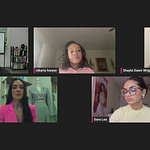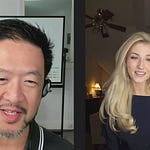Each week, I share no-fluff pageant coaching that helps you win. Both on stage and off. After coaching titleholders in Miss Universe, Miss USA, Miss America, and 350+ pageant interviews, this isn’t theory. It’s what works.
I want to start with two real women I know and respect. Not theory. Not gossip. Actual results on actual stages.
One is Sheridan Mortlock here in Australia. She earned the Miss Earth Air title—first runner‑up at one of the biggest internationals. That’s no consolation prize; coming from Australia, that placement was an enormous deal and—at the time—our best result at that pageant.
The other is Presly Pedigo in the Miss USA system. Within weeks, she went from not placing at Miss Tennessee USA to top three at Miss South Carolina USA. Same woman. Same résumé. Different stage, different night—wildly different outcome.
If those two data points don’t make you question the way we talk about judging, I don’t know what will.
Two Women, Three Results: Why the Math Doesn’t Add Up
Sheridan’s story messes with the tidy narrative that a single result defines your ceiling. First runner‑up at an international like Miss Earth is an elite outcome by any measure, yet in a different system she didn’t replicate the same success. Presly’s back‑to‑back experiences are even starker: no placement in Tennessee, then top three in South Carolina barely two months later.
What changed? Not Presly. Not in any meaningful way. But the panel, the preferences, the night, the room—they changed. That alone should tell you something: pageant judging is not a universal measuring stick. It’s a snapshot taken by a small group of humans with their own habits, blind spots, and personal scales.
This is the part most people in the industry say they understand, but keep forgetting when results go up. A different panel can (and often will) produce a different outcome for the same woman. That’s not scandal; that’s statistics.
The Myth of the All‑Knowing Judge
Let me say the quiet part out loud: most judges don’t really know what they’re looking for—at least not in a precise, shared, defensible way. They’re not running a calibrated rubric; they’re picking favorites (often without realizing it) and writing numbers that feel right in the moment.
When I say that, I’m not accusing anyone of bad faith. I’m pointing at normal human psychology. We all carry biases—conscious and subconscious. Think about how polarizing topics like politics, climate change, and gender can be. You can sincerely believe you’re being neutral while your personal values are steering the wheel.
Now add another layer: scoring scales. If you put ten judges in a room and ask, “What score does a solid-but-not-outstanding contestant deserve?” you’ll get ten different answers. Some judges live in the 7–10 range and hand out eights like Tic Tacs. Others reserve 9s for unicorns and think a 6.5 means “good.” When those numbers get averaged, the composite can reflect scale habits more than contestant quality.
Totals look objective. They aren’t. They’re a mash‑up of personal sliders that no one bothered to normalize.
What the Scores Don’t Show (And What Systems Claim to Want)
Listen to how systems describe their ideal: We want a role model. We want an advocate. We want a brand ambassador. We want a woman who’ll do the job. Great—show me where that’s measured.
If your criteria say 25% interview, 25% evening gown, 25% swim/fitness, 25% talent (or whatever your flavor is), explain to me how that rubric actually selects for the qualities you say you value. Don’t just say “we know it when we see it.” Define it. If “advocacy” matters, where is it evaluated? If “community impact” matters, where does it live on the sheet?
Without that connection, judging becomes a vibe check: we end up rewarding pageant‑night performance over the year‑long job. That’s how you get whiplash outcomes like Sheridan and Presly—phenomenal women by any reasonable standard, shifted around by which slice of the job a panel unconsciously prioritized on a given night.
Why ‘Totals Lie’: A Quick Reality Check
Let me give you a simple way to think about this. In school, we talk about percentiles to account for difficulty and cohort. Your raw mark doesn’t exist in a vacuum; it’s compared against everyone else’s. Pageant judging rarely does that level of normalization. We add up scores as if a 9.2 from Judge A means the same thing as a 9.2 from Judge B.
It doesn’t. Judges live on different scales. Some avoid tens on principle. Some won’t go below a five because it feels “mean.” If we don’t anchor those scales or calibrate before the show, the final spreadsheet is a confidence trick: it looks scientific, but it’s mostly preference packaged as maths.
None of this means pageants are “rigged.” It means they’re human. And when you accept that, your strategy changes.
Stop Twisting Yourself Into a Pretzel
Here’s where I’m going to upset a few people: “I know what judges want” is one of the most misleading sales pitches in our industry. You’ll see coaches post win after win on Instagram, which creates the illusion of a predictive formula. But you’re only seeing the wins. You’re not seeing the many clients who didn’t place—or who placed well in one system and not at all in another. That’s survivorship bias dressed as expertise.
If 90% of a panel is operating on gut and habit (and yes, I’m being blunt on purpose), contorting yourself to chase their taste is a losing game. You can spend your time and money sanding off your edges in hope that a hypothetical panel might like you more, or you can spend that energy becoming unmissable on your own terms.
Pick one.
Be Unmissable: Branding and Meaning Over Beige
This is where the Taylor Swift comparison is useful. There are countless singers who can sing as well as Taylor and write songs as well as Taylor—and you’ve never heard of them. Why? Because meaning travels further than raw ability. Taylor’s brand is clear, repeatable, and emotionally legible. You know what she stands for before she opens her mouth.
Translate that to pageantry. If I asked your friends or work colleagues for three words that describe you, would they say something sharp and specific—or some combo of “nice/quiet/friendly”? If it’s the latter, you’ve branded yourself beige. Beige gets lost on stage. Unmissable women get remembered even when they don’t win.
That’s not a call to be fake; it’s a challenge to clarify. Define your message in plain English. Show it consistently across your socials. Live it in interview. Let your wardrobe, walk, and on‑stage answers deliver the same story. Then choose systems that actually align with that story instead of forcing yourself into a template that doesn’t fit.
How I Want You to Think About Results
When a result doesn’t go your way, don’t rush to burn everything down. First ask:
Did the panel’s unspoken preferences simply tilt away from what I bring?
Did the scoring emphasize pageant‑night performance over the year‑round job I’m actually built for?
Am I competing in a system that matches my strengths, or am I trying to be someone else’s idea of a winner?
If you can answer those honestly, you’ll stop taking one night’s spreadsheet as a moral verdict on your worth. You’ll also become a better strategist: choosing the right stage, for the right reasons, with a brand that doesn’t rely on a perfect panel to make sense.
Sheridan and Presly didn’t become better or worse women based on where they placed. The judging lens changed. And it will keep changing. Your job is to be so clear, so consistent, and so unmistakably you that when the right lens shows up, the decision is obvious.
—Adrian
Timestamps
00:00 – Intro: the ugly truth about judging
00:45 – Case study: Sheridan Mortlock & Miss Earth Air
05:01 – Case study: Presly Pedigo (TN → SC swing)
09:18 – Bias 101: politics, climate, gender
11:58 – “Show me where it’s measured” (the rubric challenge)
12:40 – Percentiles analogy: why totals lie
19:19 – Do judges really know what they’re doing?
22:28 – Strategy pivot: stop formula-chasing → build your brand
23:22 – Taylor Swift lesson: meaning beats raw talent
38:13 – Closing: maybe it’s luck—so focus on brand & delivery
I offer a limited number of private coaching sessions per month for women serious about elevating their pageant journey. Click below to book yours.
Pageantry is evolving—and you deserve coaching that’s more than surface-level. Book in if you're ready to go beyond the crown.









